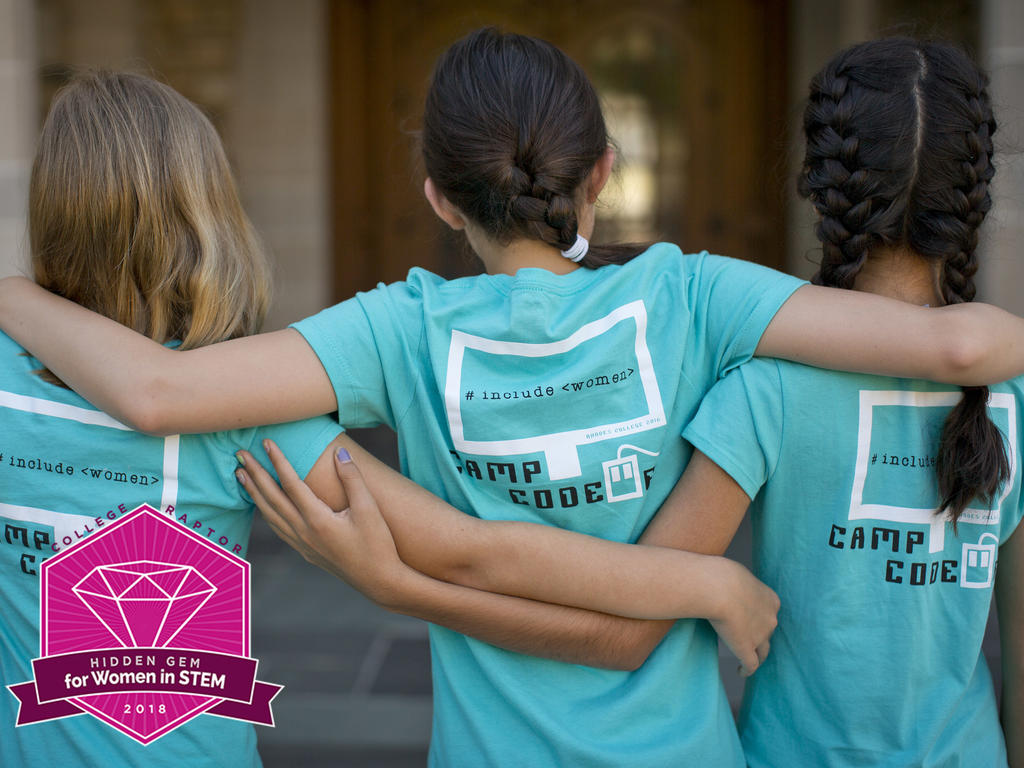Some studies have shown the girls tend to lose interest in math and science as they get older, but that isn’t the case for neuroscience major Ellie Fratt ’18, who says as a child she was more interested in taking the heart rate of her dolls than in dressing them in new clothes. In 2016, Fratt received the B.A. Rudolph Foundation’s STEM (Science, Technology, Engineering and Mathematics) Scholarship to conduct research at St. Jude Children’s Research Hospital, and she is just one example of women at Rhodes preparing to enter a profession in the sciences.
College Raptor, an online resource that helps prospective college students explore college options, recently ranked Rhodes No. 10 among schools across the country as a “Hidden Gem for Women in STEM.”
Dr. Ann Viano, associate professor of physics at Rhodes, says, “One of the best ways to encourage women to pursue science is by providing good role models. The Rhodes science faculty is approximately 50 percent female. Rhodes science students have ample opportunities to learn from, and work with, active female scientists. It is not difficult for them to seek out advice about how to face the perceived challenges of being a woman in STEM.”
Viano is a former president of the national physics honor society, Sigma Pi Sigma (SPS), which presented the Rhodes SPS chapter a Future Faces of Physics Award to host an egg drop competition last April for Memphis girls ages 8 to 13. The competition, which encourages future scientists, involved critical thinking and problem solving as well as creativity in designing a container to protect an egg from cracking when dropped off a building. Viano also is the coordinator of Rhodes’ Dual Degree Program in Engineering, which works in tandem with the University of Tennessee Health Science Center, University of Memphis, and Washington University in St. Louis so that students can pursue a biomedical engineering degree. Katie Tooley ’19, for example, has just moved into the two-year engineering portion of the program at Washington University.
Dr. Darlene Loprete, professor of chemistry and chair of the department 2010-2013, is a contributor to a chapter in Mentoring Strategies to Facilitate the Advancement of Women Faculty. The chapter discusses institutional and departmental mechanisms that support women faculty in chemistry at liberal arts colleges in different stages of their career, from the pre-tenure years through retirement.
“In 1990, when I was hired, I was one of five faculty members in chemistry and the only woman. Today, we have seven women out of 11 faculty in chemistry; that is 64 percent. Too, we have faculty from diverse backgrounds,” says Loprete. “The more experiences we bring, hopefully a student can find someone to relate to.”
She adds that the group who worked on the book project looked at both vertical mentoring (senior to junior faculty) and horizontal mentoring (junior to junior and senior to senior). “Our group even talked about having children and how that sometimes presents challenges because you are working all the time. We looked at how to balance work and personal life.”
Rhodes provides a culture where science students work alongside faculty and are encouraged to be independent thinkers. Dr. Mary Miller, associate professor of biology and past chair of Rhodes’ Biochemistry and Molecular Biology Program, often has spoken about her students being mistaken for graduate students when presenting at conferences. In addition, students of Dr. Sarah Boyle, associate professor of biology, have won top prizes for geographic information system (GIS) research projects. McKenna Davis ’18, a physics and mathematics major, was one of 240 sophomores and juniors nationwide to be chosen as a Goldwater Scholar for the 2017-2018 academic year. Even as an undergraduate, she already has articles in publications by the Electrostatic Society of America and by the Institute of Electrical and Electronics Engineers.
In April, Emma Selner ’18 presented her research “Design of Novel Inhibitors for the Aldehyde Dehydrogenases” to members of Congress at the 2017 Posters on the Hill. “Rhodes provides accessibility to life-changing experiences such as attending national conferences and performing real-world research; both of these have impacted my life greatly,” says Selner. “Without the mentors, teachers, and support Rhodes provides, I would not be as passionate or as persistent in my pursuit of a career in STEM as I am today.” Her plans after Rhodes include medical school or a medical scientist training program.
Also this spring, Dr. Betsy Sanders, associate professor in the Department of Mathematics and Computer Science, was presented Rhodes’ Clarence Day Award for Outstanding Research and/or Creative Activity. Since joining the Rhodes faculty in 2007, she has helped to build the computer science program at Rhodes. Each summer, she helps to host Camp Codette, which brings middle school girls on campus to learn coding.
These are just a few examples of the women of STEM at Rhodes. “If we know students have gone to graduate school, we might invite them back to give a seminar— that’s a good way to have former students who have received Ph.D.’s speak here,” says Loprete. “Our alums communicate with us if there are opportunities available for them to provide help to current students. I think this is powerful.”
VIDEO: Dr. Loretta Jackson-Hayes, associate professor of chemistry at Rhodes, presented TEDxMemphis talk in 2016 on STEM education in the liberal arts environment.
[video:https://www.youtube.com/watch?v=QtICKJnQn6I]
